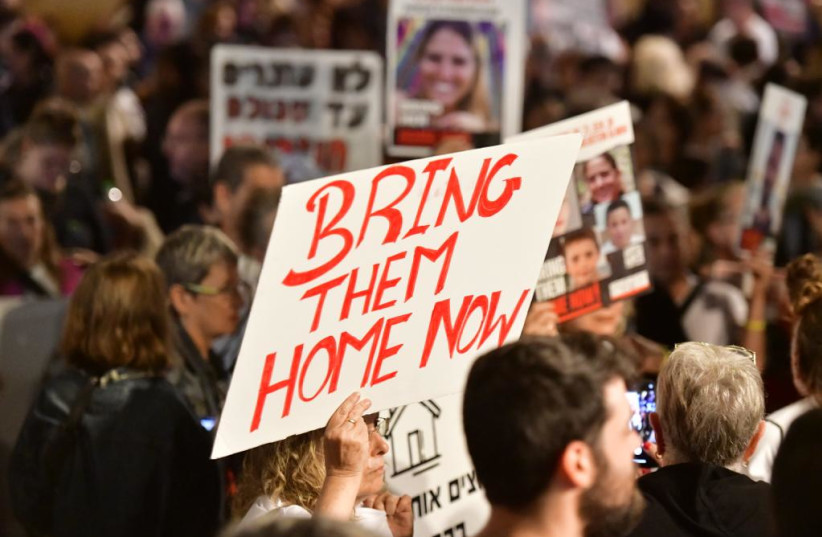On Sunday, Israel’s Ashkenazi Chief Rabbi David Lau published a Passover prayer for the release of the hostages that he said should be said during the Seder before “Vehi She’amda,” which describes how God saved the Jewish people from those seeking to destroy them.
While we are appreciative of Rabbi Lau’s action and the powerful words of his prayer, we pray that the hostages will come home before Passover, so that we can all observe the Festival of Freedom together.
“In a few days we will sit at the Seder table,” Lau wrote in a special letter in Hebrew introducing the prayer. “We will talk about the hardships and slavery in Egypt, and we will give thanks for the salvation that we have received. However, not all family members will be seated at their tables. There are families in which missing loved ones and emptiness scream out.
"The seats of the murdered and those abducted by the people of evil are left empty.”
We are obligated to feel the pain of our people and pray for them
Addressing the Jewish people, he said: “Each one of us has the holy obligation to feel the pain of our neighbor and to recite a special prayer during the momentous event of reading the Passover Haggadah, and to remember and pray for those hostages who are in pain and captivity.”

The chief rabbi’s Yehi Ratzon prayer, also written in Hebrew, can be translated to English as follows:
“May it be the will of our Father in Heaven, who took the people of Israel out of the yoke of Egypt, to bless and save our brothers and sisters, the hostages who are held in iron chains, strengthen their souls and faith, protect them from all harm and sickness, have mercy on His sons and daughters who seek His salvation, and annul all cruel decrees. With His great kindness, may He expedite their redemption and speedily take them from darkness to light, and from the abyss of captivity to eternal freedom, and return them safely to their families and homes.”
Appealing to God, the prayer concludes: “Please plant brotherhood, peace and friendship in everyone’s hearts. Remove jealousy and baseless hatred, and spread over us the shelter of Your peace; and we should soon merit to sing before You a new song.”
According to informed sources and media reports, under heavy pressure from the United States, Israel and Hamas are close to a deal for a staged return of the remaining hostages, mediated by the US, Egypt and Qatar. Israeli officials believe that 133 hostages remain in captivity of the 253 abducted on October 7.
We pray that most of them are still alive, but we know that some are not. Citing intelligence, the IDF confirmed the deaths of 34 of those still held by Hamas, while one person is still listed as “missing” since October 7.
In addition to those hostages, Hamas is believed to be holding two Israelis – Avera Mengistu and Hisham al-Sayed – who crossed into Gaza in 2014 and 2015 respectively – and the bodies of two soldiers, Lt. Hadar Goldin and Staff Sgt. Oron Shaul, who fell in Operation Protective Edge in 2014.
According to Israeli officials, Israel has proposed in talks in Doha and Cairo the release of 40 hostages in the first stage of a new deal involving a six-week truce, during which Israel would free 700 Palestinian security prisoners.
On November 22 last year, Israel and Hamas agreed to a temporary ceasefire after which Hamas released 105 hostages – 81 Israelis, 23 Thais and one Filipino. On February 12 this year, the IDF rescued two hostages in a daring operation in Gaza called Operation Golden Hand.
The seven-day festival of Passover begins on the evening of April 22, when Jews around the world will sit down for the traditional Seder during which they will read the Hagaddah, the story of the Jewish people’s exodus from Egypt under the leadership of Moses in the 13th century BCE.
That means we now have about 10 days to bring the hostages home. Without them, it will be difficult for anyone to celebrate. As it is, we mourn and salute the more than 1,900 people, mostly Israelis, who have lost their lives since October 7, including 604 soldiers killed in combat and the three hostages mistakenly killed by the IDF in Gaza on December 15.
Perhaps the most important line in the Hagaddah is “In every generation, we must each see ourselves as if we ourselves had gone out of Egypt.” It is a historic irony that Egypt is now playing a pivotal role in hosting the negotiations for the release of the remaining hostages – for which Israel and the Jewish people are immensely thankful.
According to the late Rabbi Jonathan Sacks, “Pesach tells the revolutionary story of how the supreme Power intervened in history to liberate the supremely powerless. It is a story of the defeat of probability by the force of possibility.” We pray for a similar miracle now.
